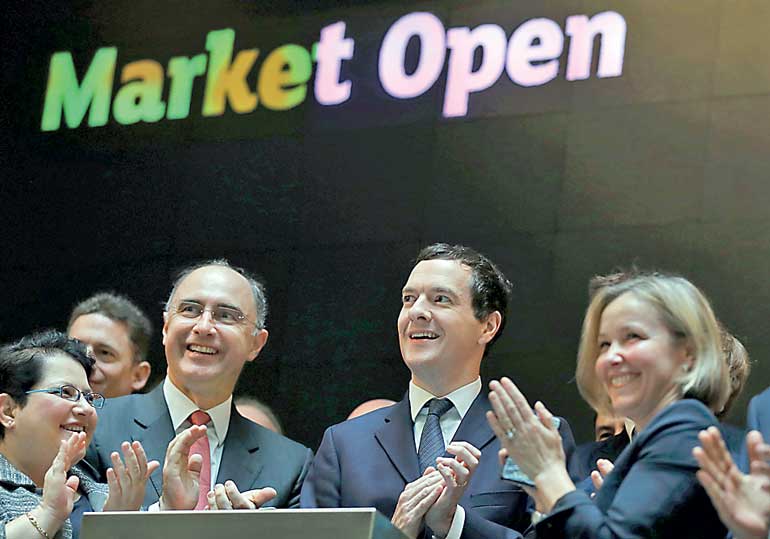Tuesday Feb 24, 2026
Tuesday Feb 24, 2026
Friday, 17 June 2016 00:00 - - {{hitsCtrl.values.hits}}
 Britain’s Chancellor of the Exchequer George Osborne (C) joins Xavier Rolet, CEO of the London Stock Exchange as he attends the inauguration of the ceremonial market opening in London, Britain 16 June – REUTERS
Britain’s Chancellor of the Exchequer George Osborne (C) joins Xavier Rolet, CEO of the London Stock Exchange as he attends the inauguration of the ceremonial market opening in London, Britain 16 June – REUTERS
Reuters: Asian stocks turned lower on Thursday after the Federal Reserve’s cautious policy stance, with Japanese equities hit hard by a strong yen and nervousness before a Bank of Japan policy decision later in the day
The dollar sagged against its peers after the Fed left interest rates unchanged overnight and was seen to have toned down its monetary tightening patch, while crude oil extended losses on Brexit concerns.
MSCI’s broadest index of Asia-Pacific shares outside Japan was last down 0.6% after briefly rising in early trade.
Japan’s Nikkei fell 1.3%, South Korea’s Kospi lost 0.5% and Shanghai edged down 0.2%. Australian stocks bucked the trend and added 0.5%.
On the whole, investors were still cautious on worries Britain may vote to leave the European Union, which saw US stocks fall for a fifth straight session overnight despite the Fed’s subdued view on interest rates.
While the US central bank kept policy steady as widely expected and lowered its economic projections, it did signal that it still planned to raise rates twice in 2016.
However, the Fed’s conviction appeared shakier with six of its 17 policymakers projecting just one increase this year. Only one Fed policymaker had done so when economic forecasts were last issued in March.
“Although the Fed’s projection tout two rate hikes, a rate hike in July is highly unlikely, which makes it questionable whether the Fed can raise rates twice in its three policy meetings left by the end of year,” said Daisuke Uno, chief strategist at Sumitomo Mitsui Bank.
Focus is now squarely on the BOJ, which concludes its two-day policy meeting later on Thursday.
While the BOJ is widely expected to keep monetary policy steady this month, speculation that the central bank would be forced to act lingered as volatile financial markets, sluggish global growth and anaemic inflation have kept policymakers under pressure to ease more. “Clearly some possibility of stimulus is reflected in recent market action, and a failure to move could see disappointment selling across the Asia Pacific region,” wrote Michael McCarthy, chief market strategist at CMC Markets.
In currencies, a decline in US Treasury debt yields following the Fed’s decision weighed on the dollar. The greenback was down 0.4% at 105.605 yen after hitting 105.410 overnight, its lowest since October 2014. The euro was steady at $ 1.1262 after gaining 0.5% overnight.
The 10-year Treasury note yield slipped to 1.555%, a four-month low.
The recent bout of global risk aversion generated by Brexit fears have boosted safe-havens like government debt, sending the German and Japanese benchmark 10-year yields to record lows this week.
The Brexit concerns also saw US crude oil fall 1% to $ 48.57 a barrel, on track for a sixth straight day of losses. Brent crude was down 0.8% at $ 48.57 a barrel.
Spot gold touched $ 1,300.50 an ounce, highest since 3 May, thanks to the Fed’s seemingly more cautious approach to monetary tightening. Higher interest rates tend to diminish the appeal of non-yielding gold.